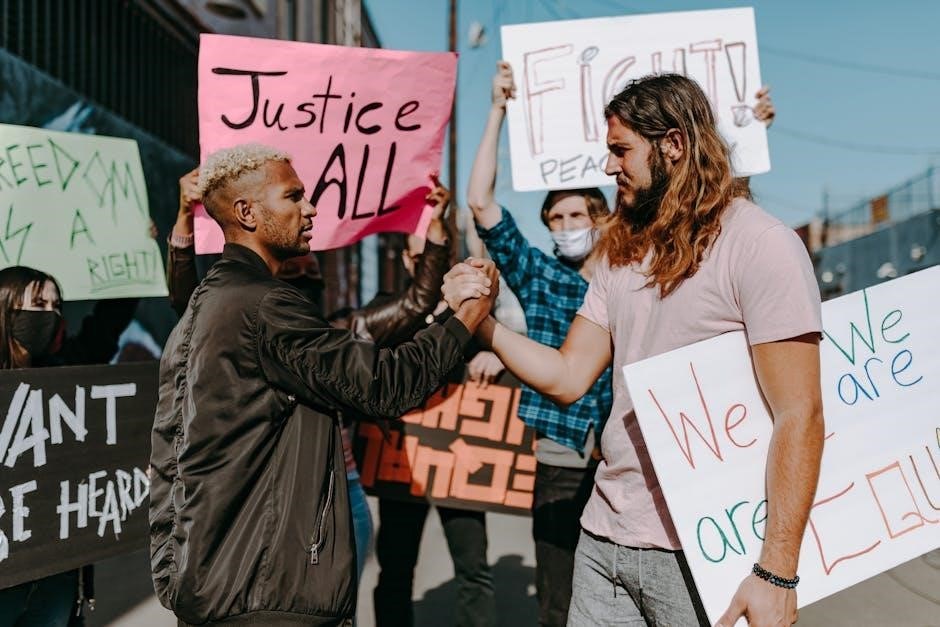Understanding your rights during police interactions is crucial for fair treatment. Law enforcement must respect constitutional protections, including the Fourth Amendment, which safeguards against unreasonable searches and seizures. Knowing these rights empowers individuals to navigate encounters confidently and safely.
The Importance of Understanding Your Rights During Police Encounters
Understanding your rights during police encounters is essential for ensuring fair treatment and accountability. Law enforcement interactions can be stressful, but knowing your rights helps you navigate these situations confidently. Recognizing when you can remain silent, refuse searches, or request documentation protects you from potential overreach.
Without knowledge of your rights, you may unintentionally waive protections guaranteed by law. For instance, the Fourth Amendment safeguards against unreasonable searches, requiring a warrant for home entry. Awareness of these principles ensures you can assert them when necessary, fostering a safer and more respectful interaction.
Stay informed about your rights to prevent misunderstandings and promote accountability. Understanding your rights empowers you to advocate for yourself and others, ensuring justice and fairness in every encounter with law enforcement.
Know Your Rights: What the Police Might Not Tell You
Police may not always inform you of your rights during encounters. Understanding these rights, such as the Fourth Amendment protections against unreasonable searches, is essential to ensure fair treatment and avoid unnecessary conflicts with law enforcement.
Understanding the Fourth Amendment: Search and Seizure Rights
The Fourth Amendment protects individuals from unreasonable searches and seizures, ensuring privacy and security. Law enforcement must obtain a valid warrant signed by a judge to enter or search a home. This amendment requires probable cause, meaning officers must have credible reasons to believe a crime is occurring. Without a warrant or exigent circumstances, police generally cannot search private property. Understanding these rights is vital, as violating them can lead to evidence being suppressed in court. If officers enter without proper authorization, individuals can legally refuse entry and request a warrant. Knowing these protections helps safeguard personal freedoms and ensures fair treatment under the law. It’s essential to stay informed about your rights to prevent unlawful searches and maintain justice.
When Police Can Enter Your Home: The Need for a Warrant
Under the Fourth Amendment, police generally need a warrant to enter and search your home. This constitutional protection ensures that law enforcement cannot intrude without justification. A valid warrant must be signed by a judge and based on probable cause, ensuring that the search is reasonable and lawful.
Exceptions exist, such as in emergency situations where immediate action is necessary to prevent harm or destroy evidence. However, these cases are rare and strictly defined. immigration officers or police must also obtain a warrant to enter your home, reinforcing the Fourth Amendment’s safeguards against unreasonable invasions of privacy. Understanding these protections is essential to asserting your rights effectively during such encounters.
Your Rights During a Traffic Stop
During a traffic stop, remain calm and cooperative. Identify yourself as requested, but avoid unnecessary conversation. You have the right to ask why you were stopped and can politely decline searches without a warrant.
What to Do If You’re Pulled Over: Identifying Yourself and Staying Calm
If you’re pulled over by the police, staying calm and cooperative is key. Always identify yourself by providing your driver’s license, registration, and insurance upon request. Keep your hands visible and avoid sudden movements to ensure safety for both you and the officer. Remain respectful and avoid arguing, even if you believe the stop is unjustified. You have the right to ask why you were pulled over, but do so politely. If you’re unsure about your rights during the stop, remember that you can seek clarification without confrontation. Know when to stay silent and avoid volunteering unnecessary information. After the interaction, document the details of the stop, including the officer’s name and badge number, in case you need to file a complaint later. Always wait for the officer to dismiss you before driving away. Understanding these steps can help ensure a safe and lawful interaction with law enforcement during a traffic stop.

Staying Silent: Your Right to Remain Silent
Exercising your right to remain silent protects you from self-incrimination. Police must inform you of this right, and you can invoke it without consequences. Always stay calm and politely decline to answer questions.
Why You Should Exercise Your Right to Remain Silent
Exercising your right to remain silent is a critical protection during police interactions. The Fifth Amendment guarantees this right to prevent self-incrimination, ensuring that anything you say cannot be used against you in court. Remaining silent avoids unintended consequences, as even casual statements can be misinterpreted or twisted. It also shields you from unknowingly providing evidence that could harm your case. By staying quiet, you deny law enforcement the opportunity to gather potentially damaging information. This right is especially vital if you are unsure of your legal situation or the nature of the questioning. Always remember that you are not obligated to answer questions that could incriminate you. If unsure, politely decline to speak and request legal counsel immediately. This proactive approach safeguards your rights and reduces the risk of legal complications down the line.

Non-Citizens’ Rights During Police Encounters
Non-citizens have rights during police interactions, including the right to remain silent and refuse entry without a warrant. Law enforcement must respect these protections, ensuring fair treatment regardless of citizenship status.

What Non-Citizens Need to Know About Interacting with Law Enforcement
Non-citizens have specific rights during interactions with law enforcement that are important to understand. While these rights may differ from those of citizens, they are still protected under the law. For instance, non-citizens are not obligated to answer questions about their immigration status or nationality. They also have the right to remain silent and request legal counsel.

During home visits, immigration officers or police must present a valid warrant signed by a judge to enter. Non-citizens should ask to see identification and understand that cooperation is voluntary unless legally mandated.
Knowing these rights can help prevent misunderstandings and ensure fair treatment. Staying calm, seeking legal advice, and documenting interactions are crucial steps for non-citizens to protect themselves during such encounters.

Leave a Reply